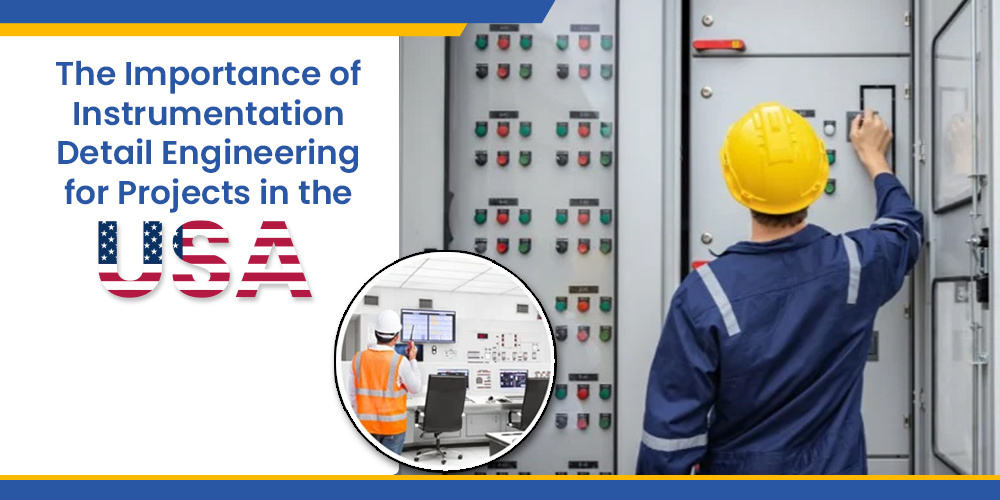The Importance of Instrumentation Detail Engineering for Projects in the USA
- January 7, 2025
- Posted by: amol pharos
- Category: Uncategorized

In the fast-paced world of industrial projects, especially in the USA, ensuring precision, efficiency, and safety is paramount. One of the critical components that play a vital role in the success of these projects is Instrumentation Detail Engineering. This process involves designing, installing, and maintaining instruments and systems that are essential for monitoring and controlling industrial processes. Whether it’s for power plants, chemical industries, or oil & gas sectors, the significance of instrumentation detail engineering cannot be overstated.
At iPAC Automation, we specialize in providing comprehensive instrumentation engineering services that help our clients optimize their operations while ensuring compliance with industry standards. In this blog, we explore the importance of instrumentation detail engineering in the USA and how it contributes to the smooth execution of industrial projects.
1. Ensuring Precision in Industrial Operations
Instrumentation systems are designed to measure, control, and monitor physical processes such as temperature, pressure, flow, and level. These systems are critical to maintaining operational stability and ensuring processes run within required parameters. In the USA, industries rely heavily on automation and precision for their day-to-day operations, and Instrumentation Detail Engineering is essential in achieving this precision.
An instrument’s calibration and functionality, along with the correct integration into a control system, must be carefully designed. This process ensures that all equipment performs optimally and that there are no deviations from the desired operational parameters, reducing the risk of errors, downtime, or accidents.
iPAC Automation offers tailored Instrumentation Engineering Services that guarantee high-quality designs for every project, from initial consultation to final installation.
2. Compliance with Safety and Regulatory Standards
In the USA, industries must adhere to strict regulations related to safety, quality, and environmental protection. Proper Instrumentation Detail Engineering ensures that systems are designed in compliance with national and international standards. This is particularly critical in sectors such as pharmaceuticals, oil and gas, and chemical processing, where safety is a top priority.
A well-engineered instrumentation system plays a crucial role in safety-critical applications, such as emergency shutdown systems, fire suppression systems, and hazard detection. Inadequate design or improper system integration can lead to catastrophic failures, not only jeopardizing the safety of personnel but also causing significant financial and reputational damage.
By choosing the right partners like iPAC Automation, who offer Expert SIL Verification and functional safety engineering services, companies can ensure their systems meet regulatory requirements while maintaining a focus on operational efficiency.
3. Optimizing Project Timelines and Costs
In large-scale industrial projects, time is money. The longer a project takes, the more expensive it becomes. Instrumentation detail engineering plays a crucial role in optimizing project timelines by providing well-planned, efficient designs. When all the instrumentation systems are thoroughly planned and designed from the outset, it eliminates the need for last-minute adjustments or revisions, which could lead to delays.
Moreover, it helps in reducing project costs. A properly designed instrumentation system reduces the chances of unexpected failures and costly repairs during the operational phase of the project. By partnering with iPAC Automation, businesses can benefit from our offshore instrumentation design services, allowing them to save on costs without compromising quality.
For more information on how we support businesses in saving time and cost, check out our Instrumentation Design Services.
4. Seamless Integration with Control Systems
Instrumentation systems do not function in isolation. They need to be seamlessly integrated with control systems such as PLC (Programmable Logic Controllers) or DCS (Distributed Control Systems). This integration ensures that the measured data from the instruments is accurately processed and used for decision-making, such as controlling pumps, valves, and motors.
At iPAC Automation, we provide expert PLC programming and DCS programming services that integrate instrumentation systems with control systems, enhancing automation efficiency. The combination of Instrumentation Detail Engineering and control system integration ensures smooth operations and reduces human intervention, minimizing errors and maximizing productivity.
To understand more about how control systems are integrated into projects, visit our Control Automation Engineering Services.
5. Scalability and Future-Proofing
The industrial landscape is constantly evolving. New technologies, changing market demands, and regulatory updates require flexibility in design. Proper instrumentation detail engineering ensures that systems are not only efficient in the present but also adaptable for future growth. By considering scalability during the design phase, businesses can avoid costly retrofits or complete overhauls in the future.
With iPAC Automation’s expertise, you can ensure that your instrumentation systems are future-proof, capable of accommodating new technologies or processes as your business grows.
6. Enhanced Operational Efficiency and Productivity
Finally, well-designed instrumentation systems directly contribute to the operational efficiency of any project. By providing accurate data, improving the automation process, and ensuring timely responses to any process deviations, instrumentation detail engineering enhances productivity. In industries such as oil & gas, chemical processing, and pharmaceuticals, where downtime or operational inefficiencies can result in significant losses, a well-engineered system ensures that operations continue smoothly and safely.
Conclusion
In conclusion, Instrumentation Detail Engineering is an indispensable part of successful industrial projects in the USA. It ensures that systems are precise, safe, compliant, and optimized for efficiency. By partnering with iPAC Automation, you gain access to a team of experts who understand the importance of quality instrumentation engineering and who are committed to delivering solutions tailored to your project’s specific needs.
If you’re interested in exploring our Instrumentation Engineering Services or learning more about our expertise in the field, feel free to reach out to us at iPAC Automation.
iPAC Automation is your trusted partner in ensuring the success of your instrumentation systems, offering industry-leading services that drive efficiency, safety, and compliance.
